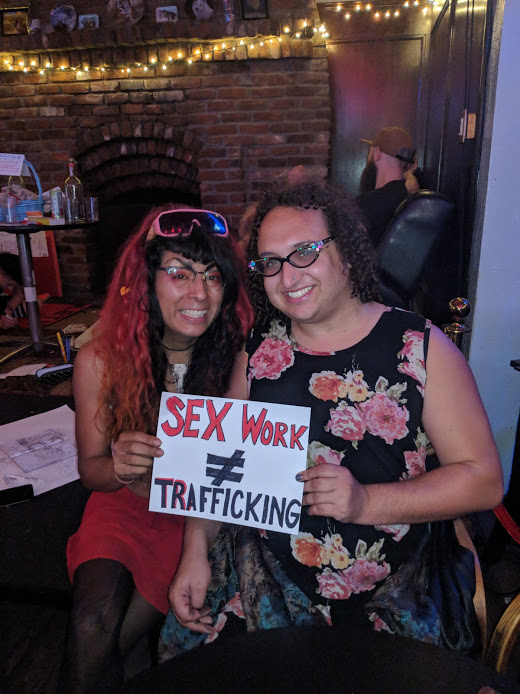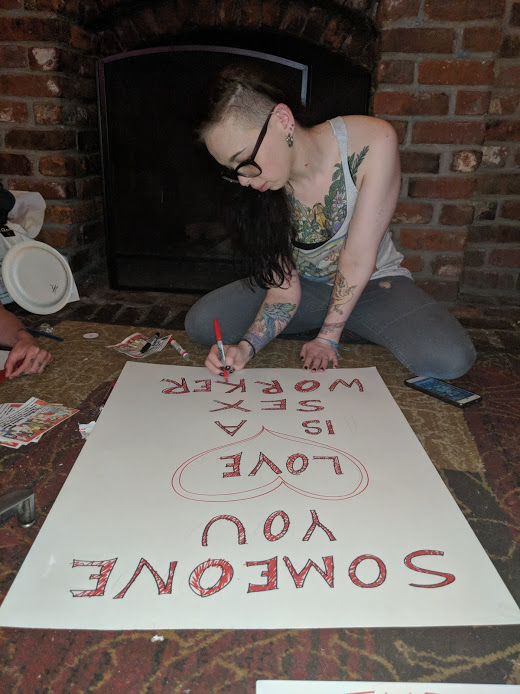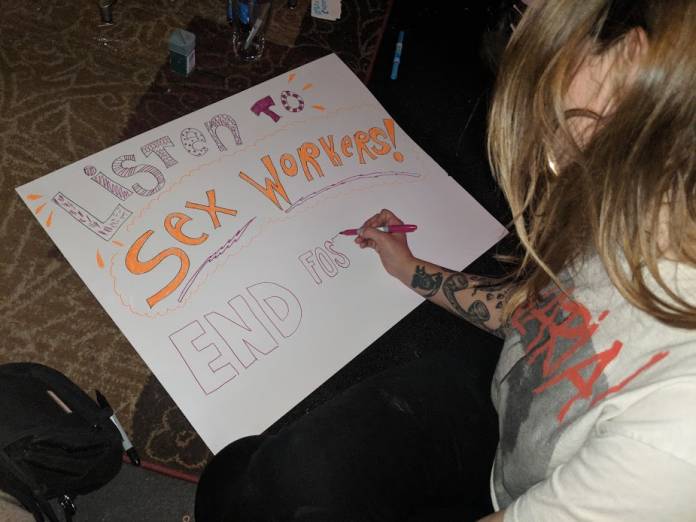It’s been three months since the passage of SESTA/FOSTA, the new law purportedly intended to curb sex-trafficking, which makes website owners liable for any such crimes committed using their platform. The effect has already been severe on sex workers, and many more. Stripper hashtags have been disappeared on Instagram. You can no longer find a date on Craigslist. Backpage has been completely shut down and “seized” by the FBI. Some observers have seen tent cities explode in size, possibly due to loss of sex worker income. If there was any doubt that SESTA/FOSTA would not have a deleterious effect on people who are not being trafficked, it has been subject to a Ctrl-Alt-Delete.
But thus far, public response to the new regulations, beyond the usual internet outrage, has been limited to out-of-the-closet sex workers and clients — a relatively small portion of the US residents who have been affected.
That may change on Saturday, this year’s International Sex Workers Day, when those who have been impacted by SESTA/FOSTA have decided to take action. Demonstrations are planned across the country. In the Bay Area, concerned citizens can show up to support sex workers at noon for a rally and march in Oakland’s Oscar Grant Plaza organized by post-SESTA/FOSTA sex worker care group Bay Area Pros Support [BAPS].

Pick your reason to march — there is much to protest. Trans women sex workers, already an at-risk population, have seen many of their online resources for finding clients targeted, including the closure of website Hung Angels escort review forums. The loss of cheap and easy ways to advertise online can be calamitous to low income sex workers. In a May 14th appearance on The Oldest Profession podcast, co-founder of Gay and Lesbians Living in a Transgender Society [GLITS] Ceyenne Doroshow affirmed that she’s seen an increase in sex workers living in San Francisco’s tent cities.
While Street Sheet editor Quiver Watts was unable to confirm any statistical uptick in SF’s homeless population, Friday’s sex work-themed print issue will include testimonials to post-SESTA/FOSTA challenges. “I’m sure the legislation in the long term will result in more people on the street, unable to meet their basic needs,” Watts told 48 Hills.
Even sex workers who were expecting the passage of SESTA/FOSTA have been shocked at the speed in which their world has changed. Fancy is a Indianapolis-based sex worker who shares her professional up and downs, including the repercussions of the laws’ passage, with her online audience as Professor Stripsalot. Before the laws, she mainly advertised on online classified ad site Backpage, which was seized even before the passage of the new bills. “That was the first real sign of how fast the dominoes were going to fall,” she said in an interview with 48 Hills.

This week, she announced to followers on Instagram that she would be withdrawing from her PhD program and halting home renovations due to the severe drop in her post-SESTA/FOSTA income. “I am entirely reliant on my regulars now,” she says. “I went from getting 20 to 30 business inquiries a week to maybe five. Before, probably 90% [of prospective clients] didn’t get through screening for one reason or another, but that was manageable because of sheer quantity. Now probably 98% don’t get through screening, which means I get almost no new clients.”
Without cheap and easy ways to advertise, sex workers are not just losing money — they are in danger of being deprived of things far more precious. With no online paper trail, there is less protection from clients that turn dangerous. BAPS co-founder and sex worker Arabelle Raphael reports that within her Bay Area community, there has already been four reports of rape since the bills’ passage, and one account of a worker going missing on the job. Sex workers interviewed for this article affirmed that predatory clients have been emboldened by SESTA/FOSTA to take advantage of cash-strapped sex workers. Even more troubling has been the shuttering of “bad date lists,” SW-generated directories of abusive clients, on websites like Nightshift and The Erotic Review.
Sex trafficking is, undoubtedly, the worst. But there are many reasons to think that SESTA/FOSTA was motivated by aims other than its abolition. Anti-trafficking groups run by survivors and even the US Department of Justice have warned that the elimination of online paper trails for sex workers would actually make trafficking victims less safe. The bill’s main pusher was Morality in the Media, now known as the National Center on Sexual Exploitation, a group whose central mission is to ban pornography.
Their strategy has caused legitimate alarm among most anyone found of their online privacy. Many of the sites affected by the fall-out are far from limited to use by sex workers — Google has responded by eliminating explicit content from Drive, and Microsoft has announced it will be taking similar action.
SESTA/FOSTA altered Section 230 of the Communications Decency Act of 1996, which established our basic internet freedoms. The law now holds website owners responsible for the content posted on them by other people — something that could have serious repercussions down the line for other kinds of controversial posts.
As the Electronic Freedom Foundation puts it, “FOSTA threatens the open Internet.”
Regardless of the motives behind the legislation, sex workers are now being left to care for themselves. BAPS was formed in the aftermath of the bills’ passage, grown out of an informational meeting convened by Raphael and BAPS co-founder Maxine Holloway. The group is one example of the organizing that the resilient sex worker community has done in recent months.
“We are trying to balance meeting immediate emergency needs of folks,” says Holloway. “Like having enough money for rent, groceries, medical care; supporting folks who are experiencing pressure or violence from abusive clients, pimps, or the police; and creating longer-term strategies of community care structures and programs, and policy work.”
“We are doing a ton of labor to let folks know what is going on with FOSTA and sex worker rights in general,” she continued. “It would be wonderful if allies could take some of that labor on. I’m looking forward to the day that we don’t have to work so damn hard to exist.”
Here’s a sex worker-generated lists of ways non-sex workers can help those affected by SESTA/FOSTA:
Donate More than anything, sex workers need funds to make up for the massive loss of income that has taken place. “We need to finance safety and skill shares, create outreach programs, buy resources, and provide direct assistance to help make sure that Bay Area sex workers can still pay their rent and buy groceries in the wake of FOSTA/SESTA,” Holloway says. Sex workers interviewed for this article recommended Bay Area Pros Support, Red Light Legal, Lysistrata MCCF, and SWOP Behind Bars for anyone looking to help out financially. Not all sex workers are represented by an organization, however. “Ask a popular sex worker online if they know anyone who needs financial aid,” recommends Fancy.
Educate yourself and those around you “Share information with your circles,” says Holloway. FOSTA Updates is a daily updated source for information on what SESTA/FOSTA, still-functioning escort sites, and opportunities for activism. “Sharing articles and posts to social media that help raise awareness is also helpful,” says Fancy. “Call people out for sex worker jokes. Don’t shame sex workers or their clients/customers. Help break down dehumanizing stigma on both sides of the industry. Don’t let people you know paint us as failures and our clientele as creeps.”
Do no harm Do not donate to sex worker “rescue” groups, who often employ the same disempowering and dangerous rhetoric as the organizations who pushed this legislation in the first place. “We don’t need to be rescued from the industry,” says Fancy. “Just from the government.”
Be a good client “Book services and tip well, go spend money on private dances, or even better just give money to sex workers without expecting anything in return — especially from black, brown, and otherwise marginalized workers,” says Fancy. “No need to make a big fuss, just book their services, pay and leave.”







